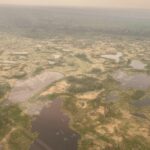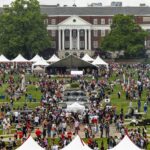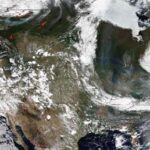On the first day of October 2013, the U.S. federal government suspended a large percentage of its operations for the first time in 17 years. Many individuals and agencies have been impacted by the shutdown, including those working in scientific research.
Current reports suggest that as much as 55 percent of the National Oceanic and Atmospheric Agency (NOAA) workforce have been sent home without pay. Although some operational weather forecasters will continue to work, much of the long term research regarding weather and climate will face consequences. Additionally, NOAA.gov, the administration’s website, is not accessible during the shutdown. A notice posted on the site stated “Only websites necessary to protect lives and property will be maintained.”
Similarly, the National Aeronautics and Space Administration (NASA) website has become inactive due to the government shutdown. Only about 600 of the 18,000 or so NASA employees will remain in work during the shutdown, according to SPACE.com. The exception being Mission Control operations staff supporting astronauts already in space.
As a researcher working at the NASA Goddard Space Flight Center, ESSIC Associate Research Scientist, Dr. Yudong Tian, is currently experiencing the initial work flow issues associated with the shutdown.
“It’s already very disruptive,” said Tian. “NASA shut down its computers on which we do research and access our data. Obviously I cannot go to the NASA campus and I cannot interact with my colleagues.”
For now, Tian says, his work is not greatly affected in the present. However, he cites a specific research example that will be affected in the long term, depending on the length of this shut down.
“I’m collaborating with ESSIC scientists to forecast floods on the globe, which depends on the forecast data from NASA. Because we rely on the precipitation forecasts to predict the flood, now that they cut off the data stream, we are left without it,” said Tian.
The inaccessible data and resources also hinder graduate students working in collaboration with these scientific programs. Adam Greeley, an atmospheric and oceanic science graduate student at the University of Maryland, has been directly affected by the shutdown. Greeley currently works on research and conducts experiments at the NASA Goddard Space Flight Center.
“It’s stuff that I just can’t do anywhere else,” said Greeley. “I can’t access some of the data that I need, and I physically work over at Goddard. So since the whole center is shut down, I can’t get to do my work there.”
Greeley says that the shutdown is also preventing him and his fellow grad students from connecting with advisers.
“All of the advisers there can’t talk to us because they can’t work. So we’re kind of left on our own,” said Greeley.
Researchers aren’t the only people in limbo during the shutdown. Those in administrative positions are feeling the pinch as well. Linda Carter, an administrative coordinator who serves as the main point of contact for Center visa processing, says that the shutdown is causing her great concern.
Some Center employees will require visa extension by the end of the year, which Carter noted she’s usually able to process well in advance of expiration. However, with the government shutdown, she’s currently unable to access the information required to complete the extensions.
“It has been a hard test for me to explain to these guys, calm down, don’t worry, hopefully the government will open up soon,” said Carter.
The failure to process the H-1B Visas on time would mean employees falling off of payroll.
“I see the stress on their faces and I hear the stress in their voices,” Carter says. “At this point there’s nothing I can do, but hope the government opens up.”
There is some recent discussion that a bipartisan House of Representatives plan could conceivably end the current stalemate. For many in the scientific community, this would be welcome news, as any prolonged federal closure could have lasting effects on both research and its associated processes.






